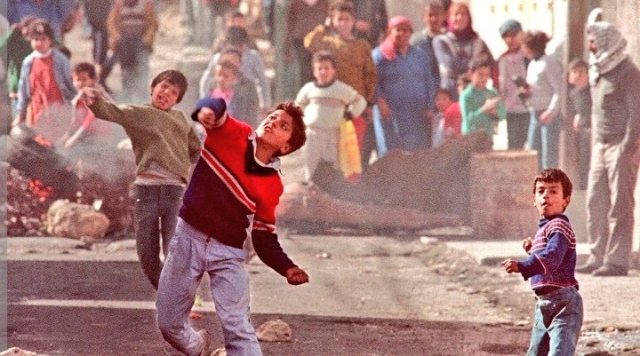On December 8th, 1987, a tragic accidental crash in which an Israeli Defense Force truck slammed into a car in the Northern Gaza Strip led to the deaths of four Palestinians. The incident would begin a chain of events known today as the First Intifada. While Palestinians claimed the crash was deliberate, a revenge attack after a Jew had been killed in Gaza two days beforehand, the IDF insisted the incident was a tragic accident.
During an average day along the Jabalya crossing into Israel within Gaza, a truck with mechanical issues accidentally crashed into several cars, leading to several injured and four dead. Some Palestinian conspiracies claim that the tank accident was in retaliation for a terrorist attack just days earlier within the Gaza Strip and the hype of that claim led to a series of protests that spiraled into violence after Palestine Liberation Organization head Yasser Arafat prompted an escalation.
The first Intifada was a series of protests and violent riots in Judea, Samaria, and Gaza, which had all been a part of Israel since the Jewish nation's victories in the 1967 Six-Day war and the 1973 Yom Kippur war. During the six-year Intifada, Palestinians did not just target Israelis, they also killed Arabs in their own communities who were seen as betraying their people by siding with Israel. Many Arabs wanted to work and have freedom of mobility.
1987 - An Israeli army tank transporter kills four Palestinian refugees and injures seven others during a traffic accident at the Erez Crossing on the Israel-Gaza Strip border, which has been cited as one of the events which sparked the First Intifada.
— Wikipedia On This Day (@wikionthisday) December 8, 2022
For those Arabs who were found to have released information to the Israelis, the PLO made examples of them by hanging them in village centers, often disemboweling them in hopes of frightening anyone who might have thought of helping Israel quell the unrest. As a result of this horrific policy, thousands of Palestinians were killed by their own communities.
In 1988, after Israel sent a commando unit to assassinate a senior leader of the PLO sitting in Tunisia, the uprising took a violent turn. The man killed was a deputy of Arafat's named Khalil al-Wazir who was also known by the moniker, 'Abu-Jihad' (the father of Jihad) and was seemingly responsible for the creation of the militant policy to use civilians to fight a war. The Arab League, in response to the assassination on Arab land, began to support the Intifada financially, giving the PLO the resources needed to continue and escalate violent rioting.
#OTD July 6, 1989, a Palestinian terrorist hijacked Bus 405 from Tel Aviv to Jerusalem and ran it off the edge of a cliff, killing 16 innocent people including two children.
— Elder of Ziyon 🇮🇱 (@elderofziyon) July 7, 2021
This was during the supposedly non-violent first intifada.#NeverForget pic.twitter.com/rHKFkVtcG5
The Israelis wanted to prove that refusing to obey the law results in consequences and the PLO wanted to prove that no Israeli civilian would be safe no matter where they were in the country. It was around this time that the idea of Palestine as a country, in Judea, Samaria, and Gaza became mainstream, and movements all over the world, funded primarily by the Arab League to mimic the strategy used in Judea and Samaria, that is using Universities across America and Europe to create a movement that would advocate for a 'Free Palestine'.
Despite the mounting civilian death toll at the hands of Arab bombers, the United Nations condemned Israel for its actions during the Intifada. Israel refused to comply with the demands of the UN because the organization did not acknowledge terror attacks on Jewish worshippers at the Western Wall or the victims of numerous bus bombings. Instead, fueled by 55 Muslim countries and their allies, the United Nations General Assembly focused its attention on Israel, claiming Israel was indiscriminately incarcerating Palestinians and silencing free speech.
Flashback #35Years...#OnThisDay in 1987: The start of what became known as "The Intifada" (later known as the "First Intifada") https://t.co/7tVgUTOkpV #Intifada #FirstIntifada #Palestinians #Israel
— Washington Views (@WashingtonViews) December 8, 2022
The Intifada began to de-escalate only after Arab countries with moderate policies helped stop the violence, confirming that extreme violence was initiated and carried out by 'Palestinian Arabs'; language that seemingly tried to separate Palestinians from other Arab communities. Jordan was first, severing financial ties with the West Bank; Saudi Arabia was next, cutting off PLO from the vast financial support it had received until then. All told, the Intifada claimed the lives of over 3000 Palestinian Arabs, mostly at the hands of PLO supporters, and over 1000 Israelis were killed.


